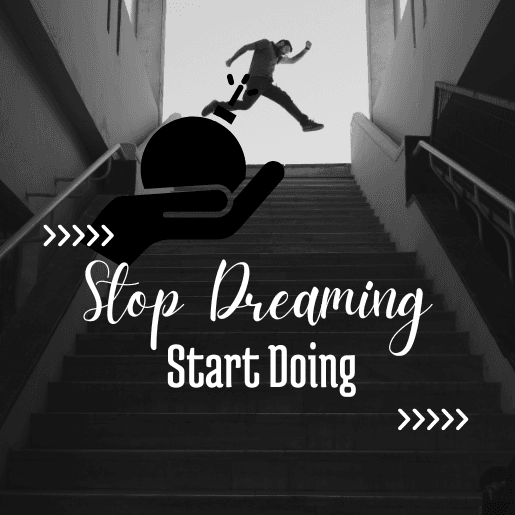Have you ever made a plan to succeed—like starting a new habit, applying for a job, or improving a relationship—only to watch yourself not follow through? You’re not alone. We often blame outside circumstances, but sometimes the biggest obstacle is ourselves. This is what we call self-sabotage.
It might show up as procrastination, negative self-talk, or setting unrealistic goals. Whatever form it takes, the result is the same: we stop ourselves from growing.
The good news? You can stop self-sabotage patterns—but first, you have to see them clearly.
What Is Self-Sabotage?
Self-sabotage occurs when you engage in actions (or refrain from taking action) that hinder your own success. This behavior tends to be fear-based—not lazy or lacking in ambition.
Common examples:
- Waiting until it’s already too late
- When facing challenges, surrendering too quickly.
- Remaining in toxic circumstances because of change aversion
- Never losing your sense of insecurity, even when you are great
Why Do We Self-Sabotage?
You’re probably not trying to fail on purpose. Self-sabotage usually comes from old beliefs that were formed to protect you. Maybe as a child, you learned it was safer to stay quiet. Or maybe failure once felt so painful, you now avoid even trying.
Root causes include:
- Fear of failure
- Fear of success (yes, it’s real)
- Low self-worth
- Perfectionism
- Past trauma or emotional wounds
Signs You Might Be Stuck in a Self-Sabotage

The first step to changing your life is recognizing the signs of self-sabotage. The truth is, most of us don’t even realize when we’re standing in our own way. The patterns can feel normal, even comfortable, because they’ve been there for so long. But once you become aware of these behaviors, you start to see just how often fear, doubt, or old habits quietly take the wheel and steer you off course. These signs aren’t meant to make you feel guilty—they’re here to help you take back control.
1. You Set Big Goals but Never Start Them
You have dreams—to write a book, to launch a business, to get in shape, to change careers. You think about them a lot. You could even write these down and discuss them with friends. But somehow, the real starting never starts. There’s never enough time, or research, or the right time for you. That day never arrives, and your goals stay in your head, safely out of reach! This is a classic act of self-sabotage. The fear and risk of failure—and sometimes even success—silently persuades you to remain where you are—stuck and safe.
2. You Talk Yourself Out of Good Opportunities
When good things happen to you—a job opening, an invitation to speak, a date, an invitation to listen to something you’re not familiar with—good things fall in your lap, you doubt yourself. You rationalize not doing things. “I’m not ready.” “They’re going to find somebody better.” “What if I embarrass myself?” Either you remain silent or speak up. Deep down, you might believe that you simply don’t deserve to be successful or happy. However, the truth is that those instances of uncertainty are actually covert acts of sabotage. They rob you of a life you’d be living because the most persuasive voice is the voice of fear.
3. You Say “Yes” and Mean “No”
One of the most discreet forms of self-sabotage is being overly focused on pleasing others. You agree instead of asserting yourself. You avoid giving tasks to others. You accept responsibilities that exhaust you. You concur with individuals solely to evade disagreement. You agree with people just to avoid conflict. From the outside, you may think it looks like kindness—but inside, you’re betraying yourself. Over time, it just creates resentment, burnout, and confusion about what you truly want. No is not selfish—it’s self-respect. But if hurting yourself has become a habit because you’re too afraid to contradict or upset others, that’s a sign your self-sabotage is all smiles.
4. You Create Drama or Distractions Before a Big Breakthrough
Just when it’s all about to sink in—when you’re finally turning a corner—something always seems to “go bad.” You get into a fight with someone. You suddenly doubt your plan. You guzzle down a series instead of finishing up that important project. These are unconscious ways of simply avoiding the unknown. Success feels scary. Growth feels unfamiliar. So your mind comes up with a way to slam on the emergency brake. Making distractions or drama provides an excuse for the brain to remain in the safe space—even if that place is entirely unsafe for the future.
5. You Quit Right Before Something Great Happens
You’ve done the hard part. You’ve been consistent. You’re so close to some kind of goal… and then, bizarrely, miraculously, you do nothing. You stop feeling motivated, you get “too busy,” you tell yourself it wasn’t really working for you, anyway. Deep down, that might just be fear talking again; fear of the unknown, fear of becoming visible, fear of being wrong once they start getting it right. Self-sabotage often comes calling just when you are closest to your objective. It’s the last stretch where your old beliefs yell the hardest. But if you’re always giving up at the edge of something great, you’ll end up living the same life over and over.
7 Simple Ways to Stop Self-Sabotage Patterns Before They Start

Breaking self-sabotage doesn’t require complex systems or expert-level routines. What it really needs is small, simple changes that you can practice consistently. These steps are meant to be doable for real people with real struggles. Even if your mind sometimes holds you back or makes you doubt yourself, these approaches help you gently regain control. The goal is not to be perfect, but to start recognizing the moments when you usually give up—and choose to respond differently.
1. Recognize Your Triggers and Inner Thoughts
The first and most important step is awareness. You cannot solve a problem if you are unaware of it. Self-sabotage typically starts with thoughts that lead you to question yourself, overanalyse, or think you are not capable enough. These thoughts might sound like, “I’ll probably mess this up,” or “Why bother? It won’t work anyway.” It’s important to start noticing when these thoughts pop up, especially when you’re about to do something that matters. Try to catch those moments where you usually hesitate or give up. Keep a simple note in your phone or a journal of when you feel blocked, what you were trying to do, and what you were thinking. Over time, you’ll see patterns. And once you see them, you can start interrupting them.
Read More On Healthline
2. Start With One Small Step, Not a Huge Leap
One common way we often sabotage ourselves is by creating massive expectations that overpower us from the very beginning. If your goal is too big, it can feel intimidating and unachievable—so you put it off or quit halfway. Instead, focus on just starting. Not finishing. Not perfecting. Just starting. Want to write a book? Start with one paragraph. Trying to exercise? Walk around the block. Starting small feels manageable. Just start and you often find it’s not as difficult as your mind led you to believe. This simple step makes action feel safe and lowers the chance of self-sabotage kicking in.
3. Make Your Surroundings Support You, Not Hinder You
Sometimes, self-sabotage isn’t just in your mind—it’s in your space. If your environment is full of distractions, clutter, or triggers, it’s harder to stay on track. Imagine trying to focus on a new project while your phone keeps buzzing or your workspace is messy. That should be sufficient to throw off anyone. You don’t require an ideal arrangement, but making minor adjustments in your environment can make a big difference. Turn off notifications. Clean your desk. Put your goals where you can see them—like sticky notes on the mirror or a reminder on your lock screen. Also, try to spend more time around people who support your growth. If your circle includes negative people who doubt your efforts, you’ll subconsciously hold back too.
4. Make Decisions Based on Your Future, Not Just Your Feelings
Emotions are powerful. They can lift us up—or completely knock us down. When self-sabotage shows up, it’s often because we’re reacting to how we feel in the moment, not what we actually want. Maybe you feel tired, scared, or uncertain, so you back off. You don’t require an ideal arrangement, but incorporating minor adjustments in your area can be very beneficial. That one question can change everything. You start acting from intention, not emotion. Try visualizing the version of you who already has the results you want—whether that’s being healthier, more confident, or more peaceful. Then do what they would do. That’s how you build habits that align with your goals and not just your moods.
5. Use Simple Tricks to Get Moving (Like the 5-Second Rule)
When you hesitate, your brain tries to protect you by steering you away from anything uncomfortable or risky. That’s where tools like the 5-second rule help. Whenever you feel the urge to do something good but scary—like starting a task or making a tough call—count backward from 5: “5, 4, 3, 2, 1… go.” The countdown helps to break through your internal resistance, providing a window of opportunity for action before your mind convinces you otherwise. It sounds small, but it’s powerful. You’ll be surprised how often a short pause followed by quick action can prevent a pattern of self-sabotage before it begins.
Related post 5-Second Rule Overcome Hesitation & Take Action
6. Treat Yourself How You Would Treat a Friend
Your inner voice is always speaking—and unfortunately, it’s often your worst critic. The way you talk to yourself is crucial. If you’re constantly calling yourself lazy, dumb, or unworthy, you start to believe it. Believe it, and act like it’s true. But here’s the thing: you’d never speak to someone you love the way you speak to yourself. What if you changed that? What if, instead of tearing yourself down, you practiced saying things like, “I’m learning,” “I made a mistake, but I’m still growing,” or even, “I did my best today.” Being kind to yourself is not weakness—it’s strength. The more you practice this, the less likely you are to fall into self-sabotage traps.
7. Reflect Without Shame and Learn as You Go
Finally, don’t forget that growth is messy. You will mess up. That’s not failure—it’s feedback. Instead of judging yourself when you notice a pattern of sabotage, take a step back and ask what triggered it. Did you feel overwhelmed? Scared? Rejected? Understanding the emotion behind your behavior helps you handle it differently next time. Keep a simple reflection routine. Maybe every Sunday, ask yourself: What worked this week? Where did I hold myself back? What can I try next time? This habit builds self-awareness and turns setbacks into valuable lessons. Learning more gives you greater power to effect change.
Build Habits That Reinforce Self-Belief

One of the most powerful ways to stop self-sabotage is by building daily habits that remind you of your own strength. These habits don’t have to be grand or complicated. In fact, the simpler they are, the more likely you are to stick with them—and the more consistent you are, the more your confidence grows.
You see, self-sabotage thrives in self-doubt. When you don’t trust yourself, it’s easy to back out of commitments, hesitate before taking action, or assume things won’t work out. But when you start stacking small wins every day, you slowly rebuild that trust. You start to believe, “I can do this,” not because someone else told you—but because you proved it to yourself.
Here are some easy habits that, over time, can reshape the way you see yourself:
1. Start Your Day with One Simple Win
How you begin your morning can set the tone for your entire day. So give yourself an easy win right from the start. It could be as small as making your bed, drinking a glass of water, stretching for 2 minutes, or taking a few deep breaths. These minor actions indicate to your brain that you are in charge. They create a mental shift from “I’m behind” to “I’m already moving forward.” And when your first action of the day is intentional, it’s easier to keep the momentum going.
2. Write Down Three Things You Did Well Each Day
Instead of ending your day thinking about what you didn’t do, flip the script. Before sleeping, write down three things you accomplished. It doesn’t matter how small they seem—maybe you answered an email you were avoiding, chose a healthy snack, or stayed calm in a stressful situation. This daily habit helps train your mind to notice progress. Over time, you’ll begin to focus less on your flaws and more on your growth. And that shift builds quiet confidence.
3. Avoid Comparing Your Progress to Others
Comparison is one of the fastest ways to fall back into self-sabotage. When you look at someone else’s journey, it’s easy to think you’re not doing enough—or that you’re too late. But you’re not them. Your story, timing, and path are completely different. Instead of comparing, try connecting. Ask others what they’ve learned. Get inspired, but stay grounded in your own progress. Remember: strive to be better than the person you were yesterday.
4. Celebrate Tiny Wins
Too often, we wait to celebrate until we’ve reached some big milestone—but that’s a mistake. If you only recognize yourself after major achievements, you’ll miss the beauty in all the small steps that got you there. Every small win matters. Did you speak up when you usually stay silent? Did you avoid scrolling on your phone and read a page of a book instead? That’s worth celebrating. Whether it’s a fist pump, a happy dance, or just saying “I’m proud of myself,” acknowledge your efforts. Receiving this encouragement makes it more manageable to continue.
5. Keep Going When It Feels Slow—Because Consistency Builds Confidence
Growth isn’t always exciting. Most days, it’s actually kind of boring. You show up, you do the thing, and nothing dramatic happens. That’s normal. Real change is quiet, steady, and slow—but it’s also what leads to lasting transformation. The trick is to keep going, even when you can’t see the results yet. Trust the process. Trust that every small step is planting a seed. Over time, your consistency becomes your strength, and that strength becomes your self-belief.
These habits aren’t magic tricks. They’re simple, practical ways to shift from self-sabotage to self-trust. You do not have to do all of them simultaneously. Start with one and incorporate it into your everyday routine. Afterwards, introduce another. Gradually, you will establish a routine that not only bolsters your objectives but also safeguards them.
Read More on Reddit
You Are Not Broken
Self-sabotage doesn’t mean you’re broken—it means you’re human. Most of us are just trying to protect ourselves from disappointment, rejection, or fear. But you deserve better.
You should be able to thrive, achieve success, and feel proud of the life you are creating.
The first step? Catch the pattern, take a breath, and choose a different action.
Ready to stop holding yourself back?
Start small. Pick one pattern you want to change. Journal about it tonight. Share your story. Let’s support each other in growth.
Explore more mindset tips at Mind-Waves.com
Stay tuned for our upcoming blog: “Why You Feel Stuck (And What To Do About It).”
Disclaimer
This blog serves solely for informational purposes and does not substitute professional medical or psychological advice. Always consult a licensed professional for mental health concerns.

